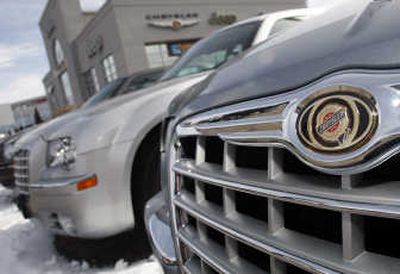More car buyers stalled

If your credit isn’t perfect, get ready for a tougher time buying a car.
You may have to make a bigger down payment, and you’ll probably pay more every month.
Lenders nationwide are tightening their standards for auto loans, which means more rejections, shorter loans and higher interest rates.
For the first time in nearly a decade, dealers are telling large numbers of buyers that they can’t afford the cars they want.
CitiGroup this month slashed about 800 jobs in its auto-lending business and says it plans to cut the number of loans it offers.
CitiGroup’s move followed cutbacks and altered credit terms by virtually all the lenders that specialize in less-than-ideal credit risks in the auto market.
“People with decent credit aren’t able to get the terms they think they should get,” said Michelle Primm, managing partner of the Cascade Auto Group in Cuyahoga Falls, Ohio, and a special director of the National Automobile Dealers Association.
Mary Kay Bean, spokeswoman for JP Morgan Chase, said her company is demanding bigger down payments and will not write loans longer than 72 months for buyers with lower credit scores.
Some buyers looking for new midsize sedans are leaving in used compact cars. Some buyers can’t even afford that.
Bill Miller, a Cleveland State University student who works full time as a mechanical engineer, said he tried to buy a car a few months ago and couldn’t get credit anywhere.
As a college student with a C-minus credit rating and some credit card debt, he knew that getting a loan would be a challenge. But he didn’t think $7,000 for a used car would be impossible.
He wanted to buy the car with his fiancee so she could drive to work. Instead, he takes long lunch breaks to drop her off.
“We were declined and declined and declined. I thought I rebuilt my credit, at least to the point of getting a car loan,” Miller said. “I guess not.”
Scott McKown, finance and insurance director for the Classic Auto Group in Mentor, Ohio, said competition among lenders as recently as last year allowed dealerships to sell cars to people who historically couldn’t afford them.
“In a lot of cases, we’d say, ‘Boy, I hope the customer can pay this,’ ” after seeing the loan terms, McKown said. “These guys tended to specialize in that low end of the business.”
The loan tightening could lead to lower car sales in a year that is already shaping up to be the worst for auto sales in more than a decade. As with the collapse of the mortgage business, lenders blame the tightening of auto credit terms on Wall Street.
Until this year, lenders such as HSBC, AmeriCredit, CitiGroup and others would package their auto loans and sell them to investors, who would make their money from borrowers’ interest payments.
But with the collapse of the mortgage market, investors no longer want to buy loans, especially loans made to buyers with shaky credit.
Without the ability to sell their loans, AmeriCredit and others don’t have enough cash to make as many loans. So they’re being more selective.
Even Ford Motor Credit, General Motors Acceptance Corp. and other lenders affiliated with automakers say they’re looking a little harder at each transaction. But those companies tend to stick to the best borrowers, so dealers said the effect of those changes has been minimal.
Some dealers said the stricter loan terms are healthy and necessary.
“When you have dealers that say they can get anybody a loan, they’re selling financing,” said Pat O’Brien, owner of several Ohio Chevrolet dealerships. “They’re not selling the car.”
He added that loan terms offered to people with poor credit were often so bad that they would have been better off not buying.
“They’re taking real advantage of the person who could least afford it,” O’Brien said.